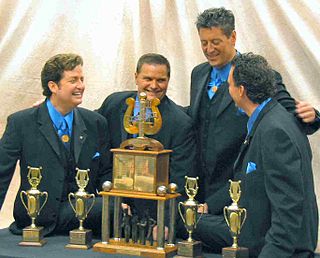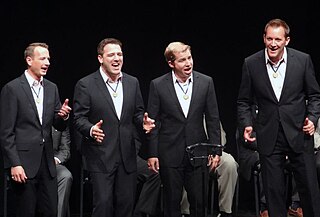A tenor is a type of classical male singing voice whose vocal range lies between the countertenor and baritone voice types. It is the highest male chest voice type. Composers typically write music for this voice in the range from the second B below middle C to the G above middle C (i.e. B2 to G4) in choral music, and from the second B flat below middle C to the C above middle C (B♭2 to C5) in operatic music, but the range can extend at either end. Subtypes of tenor include the leggero tenor, lyric tenor, spinto tenor, dramatic tenor, heldentenor, and tenor buffo or spieltenor.

A barbershop quartet is a group of four singers who sing music in the barbershop style, characterized by four-part harmony without instrumental accompaniment, or a cappella. The four voices are: the lead, the vocal part which typically carries the melody; a bass, the part which provides the bass line to the melody; a tenor, the part which harmonizes above the lead; and a baritone, the part that frequently completes the chord. The baritone normally sings just below the lead singer, sometimes just above as the harmony requires. Barbershop music is typified by close harmony— the upper three voices generally remain within one octave of each other.

The Barbershop Harmony Society, legally and historically named the Society for the Preservation and Encouragement of Barber Shop Quartet Singing in America, Inc. (SPEBSQSA), is the first of several organizations to promote and preserve barbershop music as an art form. Founded by Owen C. Cash and Rupert I. Hall in Tulsa, Oklahoma in 1938, the organization quickly grew, promoting barbershop harmony among men of all ages. As of 2014, just under 23,000 men in the United States and Canada were members of this organization whose focus is on a cappella music. The international headquarters was in Kenosha, Wisconsin for fifty years before moving to Nashville, Tennessee in 2007. In June 2018, the society announced it would allow women to join as full members.
In music, a coda is a passage that brings a piece to an end. It may be as simple as a few measures, or as complex as an entire section.

Barbershop vocal harmony, as codified during the barbershop revival era (1930s–present), is a style of a cappella close harmony, or unaccompanied vocal music, characterized by consonant four-part chords for every melody note in a primarily homorhythmic texture. Each of the four parts has its own role: generally, the lead sings the melody, the tenor harmonizes above the melody, the bass sings the lowest harmonizing notes, and the baritone completes the chord, usually below the lead. The melody is not usually sung by the tenor or baritone, except for an infrequent note or two to avoid awkward voice leading, in tags or codas, or when some appropriate embellishment can be created. One characteristic feature of barbershop harmony is the use of what is known as "snakes" and "swipes". This is when a chord is altered by a change in one or more non-melodic voices. Occasional passages may be sung by fewer than four voice parts.
Tag, TAG, or tagging may refer to:
In music theory, a dominant seventh chord, or major minor seventh chord, is a seventh chord, composed of a root, major third, perfect fifth, and minor seventh. Thus it is a major triad together with a minor seventh, denoted by the letter name of the chord root and a superscript "7". In most cases, dominant seventh chord are built on the fifth degree of the major scale. An example is the dominant seventh chord built on G, written as G7, having pitches G–B–D–F:

Barbershop arranging is the art of creating arrangements of barbershop music. The Barbershop Harmony Society (BHS) and Sweet Adelines International (SAI) have prescribed rules that dictate what is an acceptable arrangement, particularly with regard to singing in competition. This makes barbershop arranging a specialist form of arranging, rarely tackled by those outside barbershop; likewise, barbershop arrangers tend to be known only for their barbershop arrangements rather than for their work in any other musical form.

"(You're the Flower of My Heart,) Sweet Adeline" is a ballad best known as a barbershop standard. It was first published in 1903, with lyrics by Richard Husch Gerard to music by Harry Armstrong, from a tune he had written in 1896 at the age of 18. According to a 1928 newspaper story, the lyrics were inspired "by a girl who worked at the music counter of a New York department store." After failing to find a publisher with the initial title, "You're the Flower of My Heart, Sweet Rosalie", according to a story the two decided a new title was in order and were inspired by a poster advertising the farewell tour of opera singer Adelina Patti. It did not become a hit until it was performed in 1904 by the group The Haydn Quartet. The Haydn Quartet's version was #1 for 10 weeks in 1904, and the Peerless Quartet also hit #1 with their version in 1904, for three weeks, according to Joel Whitburn's Pop Memories.
The Suntones were a barbershop quartet from Miami, Florida, USA, and the 1961 SPEBSQSA international champions. At the time it won gold, the quartet featured Gene Cokeroft as tenor, Bob Franklin as lead, Harlan Wilson as baritone, and Bill Cain as bass.
Clay Hine is a barbershop musician and arranger.

"My Melancholy Baby" is a popular song published in 1912 and first sung publicly by William Frawley. The music was written by Ernie Burnett (1884–1959), the lyrics by George A. Norton.
A hanger, or a post, in barbershop music is a long note, held by one of the voices in the quartet, while the other voices are free to change notes, and even breathe. Hangers usually occur in the tag of a Barbershop song, although they may occur anywhere. The held note is typically the tonic note of the song. Any one of the four voices can have the hanger, although the hanger is typically a high note, therefore it is usually assigned to either the Lead or Tenor.

Max Q is the barbershop quartet that won the gold medal Barbershop Harmony Society International Barbershop Quartet Contest at Denver's Pepsi Center July 7, 2007. The quartet's run for the title is featured in the 2009 feature documentary American Harmony.

The harmonic seventh chord is a major triad plus the harmonic seventh interval. This interval is somewhat narrower and is "sweeter in quality" than an "ordinary" minor seventh, which has a just intonation ratio of 9:5, or an equal-temperament ratio of 1000 cents.

OC Times is a male barbershop quartet affiliated with the Barbershop Harmony Society. They earned second place silver medals at the International Barbershop Quartet Contest at Denver's Pepsi Center on July 7, 2007, and won the International Quartet Championship on July 5, 2008, in Nashville, Tennessee. The quartet combines traditional barbershop harmonies with contemporary music styles. The music of OC Times is inspired by artists like Michael Buble, Sinatra, and Elvis.

Vocal harmony is a style of vocal music in which a consonant note or notes are simultaneously sung as a main melody in a predominantly homophonic texture. Vocal harmonies are used in many subgenres of European art music, including Classical choral music and opera and in the popular styles from many Western cultures ranging from folk songs and musical theater pieces to rock ballads. In the simplest style of vocal harmony, the main vocal melody is supported by a single backup vocal line, either at a pitch which is above or below the main vocal line, often in thirds or sixths which fit in with the chord progression used in the song. In more complex vocal harmony arrangements, different backup singers may sing two or even three other notes at the same time as each of the main melody notes, mostly with a consonant, pleasing-sounding thirds, sixths, and fifths.
Future house is a house music genre that emerged in the 2010s in the United Kingdom, described as a fusion of deep house, UK garage and incorporating other elements and techniques of other EDM genres. It is high in energy, generally consisting of big drops, 4/4 beats and is sonically bass heavy.

Michael Santiago Render, better known by his stage name Killer Mike, is an American rapper and activist. He made his recording debut on Outkast's fourth album Stankonia (2000), and later appeared on their Grammy Award-winning single "The Whole World" from their greatest hits album Big Boi and Dre Present... Outkast (2001). He signed with Big Boi's Purple Ribbon Records and Columbia Records to release his debut studio album Monster (2003), which received critical acclaim and peaked at number ten on the Billboard 200. He followed up with the independent albums I Pledge Allegiance to the Grind (2006) and I Pledge Allegiance to the Grind II (2008); he then signed with T.I.'s Grand Hustle to release his fourth album Pledge (2011), and later Williams Street Records to release his fifth album, R.A.P. Music (2012). His sixth album, Michael (2023) was met with continued acclaim and won three awards at 66th Annual Grammy Awards, including Best Rap Album.

"Songs from the Wood" is the title track off of English rock band Jethro Tull's album Songs from the Wood. Written by frontman Ian Anderson, it features a folk-rock style that characterizes the Songs from the Wood album.










